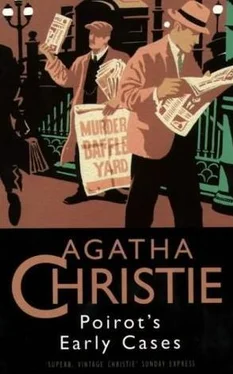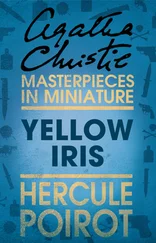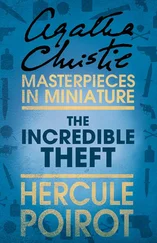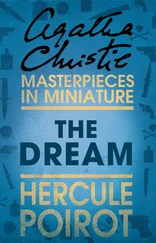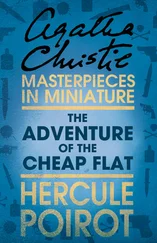Agatha Christie - Poirot's Early Cases
Здесь есть возможность читать онлайн «Agatha Christie - Poirot's Early Cases» весь текст электронной книги совершенно бесплатно (целиком полную версию без сокращений). В некоторых случаях можно слушать аудио, скачать через торрент в формате fb2 и присутствует краткое содержание. Год выпуска: 1996, ISBN: 1996, Издательство: HarperCollins Publishers Ltd, Жанр: Классический детектив, на английском языке. Описание произведения, (предисловие) а так же отзывы посетителей доступны на портале библиотеки ЛибКат.
- Название:Poirot's Early Cases
- Автор:
- Издательство:HarperCollins Publishers Ltd
- Жанр:
- Год:1996
- ISBN:ISBN-13: 978-0006167129
- Рейтинг книги:4 / 5. Голосов: 2
-
Избранное:Добавить в избранное
- Отзывы:
-
Ваша оценка:
- 80
- 1
- 2
- 3
- 4
- 5
Poirot's Early Cases: краткое содержание, описание и аннотация
Предлагаем к чтению аннотацию, описание, краткое содержание или предисловие (зависит от того, что написал сам автор книги «Poirot's Early Cases»). Если вы не нашли необходимую информацию о книге — напишите в комментариях, мы постараемся отыскать её.
Poirot's Early Cases — читать онлайн бесплатно полную книгу (весь текст) целиком
Ниже представлен текст книги, разбитый по страницам. Система сохранения места последней прочитанной страницы, позволяет с удобством читать онлайн бесплатно книгу «Poirot's Early Cases», без необходимости каждый раз заново искать на чём Вы остановились. Поставьте закладку, и сможете в любой момент перейти на страницу, на которой закончили чтение.
Интервал:
Закладка:
It was still some minutes of nine when he once more approached the garden door. It was a clear, still evening; hardly a breeze stirred the leaves. There was, perhaps, something a little sinister in the stillness, like the lull before a storm.
Poirot's footsteps quickened every so slightly. He was suddenly alarmed - and uncertain. He feared he knew not what.
And at that moment the garden door opened and Claude Langton stepped quickly out into the road. He started when he saw Poirot.
'Oh - er - good evening.' 'Good evening, Monsieur Langton. You are early.' Langton stared at him. 'I don't know what you mean.' 'You have taken the wasps' nest?' 'As a matter of fact, I didn't.' 'Oh!' said Poirot softly. 'So you did not take the wasps' nest.
What did you do then?' 'Oh, just sat and yarned a bit with old Harrison. I really must hurry along now, Monsieur Poirot. I'd no idea you were remaining in this part of the world.' 'I-had business here, you see.'
'Ohl Well, you'll find Harrison on the terrace. Sorry I can't stop.'
He hurried away. Poirot looked after him. A nervous young fellow, good-looking with a weak mouthl
'So I shall find Harrison on the terrace,' murmured Poirot.
'I wonder.' He went in through the garden door and up the path.
Harrison was sitting in a chair by the table. He sat motionless and did not even turn his head as Poirot came up to him.
'Ah! Mon ami,' said Poirot. 'You are all right, eh?'
There was a long pause and, then Harrison said in a queer, dazed voice, 'What did you say?'
'I said - are you all right?'
'All right? Yes, I'm all right. Why not?' 'You feel no ill effects? That is good.' 'Ill effects? From what?' 'Washing soda.'
Harrison roused himself suddenly. 'Washing soda? What do you mean?'
Poirot made an apologetic gesture. 'I infinitely regret the necessity, but I put some in your pocket.'
'You put some in my pocket? What on earth for?'
IIarrison stared at him. Poirot spoke quietly and impersonally like a lecturer coming down to the level of a small child.
'You see, one of the advantages, or disadvantages, of being a detective is that it brings you into contact with the criminal classes. And the criminal classes, they can teach you some very interesting and curious things. There was a pickpocket once - I interested myself in him because for once in a way he has not done what they say he has done - and so I get him off. And because he is grateful he pays me in the only way he can think of - which is to show me the tricks of his trade.
'And so it happens that I can pick a man's pocket if I choose without his ever suspecting the fact. I lay one hand on his shoulder, I excite myself, and he feels nothing. But all the same I have managed to transfer what is in his pocket to my pocket and leave washing soda in its place.
'You see,' continued Poirot dreamily, 'if a man wants to get at some poison quickly to put in a glass, unobserved, he positively must keep it in his right-hand coat pocket; there is nowhere else.
I knew it would be there.' He dropped his hand into his pocket and brought out a few white, lumpy crystals. 'Exceedingly dangerous,' he murmured, 'to carry it like that - loose.' Calmly and without hurrying himself, he took from another pocket a wide-mouthed bottle. He slipped in the crystals, stepped to the table and filled up the bottle with plain water. Then carefully corking it, he shook it until all the crystals were dissolved.
Harrison watched him as though fascinated.
Satisfied with his solution, Poirot stepped across to the nest.
He uncorked the bottle, turned his head aside, and poured the solution into the wasps' nest, then stood back a pace or two watching.
Some wasps that were returning alighted, quivered a little and then lay still. Other wasps crawled out of the hole only to die.
Poirot watched for a minute or two and then nodded his head and came back to the veranda.
'A quick death,' he said. 'A very quick death.' Harrison found his voice. 'How much do you know?' Poirot looked straight ahead. 'As I told you, I saw Claude Langton's name in the book. What I did not tell you was that almost immediately afterwards, I happened to meet him. He told me he had been buying cyanide of potassium at your request - to take a wasps' nest. That struck me as a little odd, my friend, because I remember that at that dinner of which you spoke, you held forth on the superior merits of petrol and denounced the buying of cyanide as dangerous and unnecessary.' 'Go on.' 'I knew something else. I had seen Claude Langton and Molly Deane together when they thought no one saw them. I do not know what lovers' quarrel it was that originally parted them and drove her into your arms, but I realized that misunderstandings were over and that Miss Deane was drifting back to her love.' Go on.' 'I knew something more, my fricnd. I was in Harley Street the
other day, and I saw you come out of a certain doctor's house. I know that doctor and for what disease one consults him, and I read the expression on your face. I have seen it only once or twice in my lifetime, but it is not easily mistaken. It was the face of a man under sentence of death. I am right, am I not?' 'Quite right. He gave me two months.' 'You did not see me, my friend, for you had other things to think about. I saw something else on your face - the thing that I told you this afternoon men try to conceal. I saw hate there, my friend. You did not trouble to conceal it, because you thought there were none to observe.' 'Go on,' said Harrison.
'There is not much more to say. I came down here, saw Lang-ton's name by accident in the poison book as I tell you, met him, and came here to you. I laid traps for you. You denied having asked Langton to get cyanide, or rather you expressed surprise at his having done so. You were taken aback at first at my appearance, but presently you saw how well it would fit in and you encouraged my suspicions. I knew from Langton himself that he was coming at half past eight. You told me nine o'clock, thinking I should come and find everything over. And so I knew everything.' 'Why did you come?' cried Harrison. 'If only you hadn't comel' Poirot drew himself up. 'I told you,' he said, 'murder is my business.' 'Murder? Suicide, you mean.' 'No.' Poirot's voice rang out sharply and clearly. 'I mean murder.
Your death was to be quick and easy, but the death you planned for Langton was the worst death any man can die. He bought the poison; he comes to see you, and he is alone with you. You die suddenly, and the cyznide is found in your glass, and Claude Langton hangs. That was your plan.' Again Harrison moaned.
'Why did you come? Why did you come?' 'I have told you, but there is another reason. I liked you.
Listen, rnon ami, you are a dying man; you have lost the girl you loved, but there is one thing that you are not: you are not a murderer. Tell me now: are you glad or sorry that I came?'
There was a moment's pause and Harrison drew himself up.
There was a new dignity in his face - the look of a man who has conquered his own baser self. He stretched out his hand across the table.
'Thank goodness you came,' he cried. 'Oh, thank goodness you came.'
Chapter XVI. The Veiled Lady
I had noticed that for some time Poirot had been growing in-creasingly dissatisfied and restless. We had had no interesting cases of late, nothing on which my little friend could exercise his keen wits and remarkable powers of deduction. This morning he flung down the newspaper with an impatient 'Tchah!' - a favourite exclamation of his which sounded exactly like a cat sneezing.
'They fear me, Hastings; the criminals of your England they fear mci When the cat is there, the little mice, they come no more to the cheesel'
'I don't suppose the greater part of them even know of your existence,' I said, laughing.
Читать дальшеИнтервал:
Закладка:
Похожие книги на «Poirot's Early Cases»
Представляем Вашему вниманию похожие книги на «Poirot's Early Cases» списком для выбора. Мы отобрали схожую по названию и смыслу литературу в надежде предоставить читателям больше вариантов отыскать новые, интересные, ещё непрочитанные произведения.
Обсуждение, отзывы о книге «Poirot's Early Cases» и просто собственные мнения читателей. Оставьте ваши комментарии, напишите, что Вы думаете о произведении, его смысле или главных героях. Укажите что конкретно понравилось, а что нет, и почему Вы так считаете.
